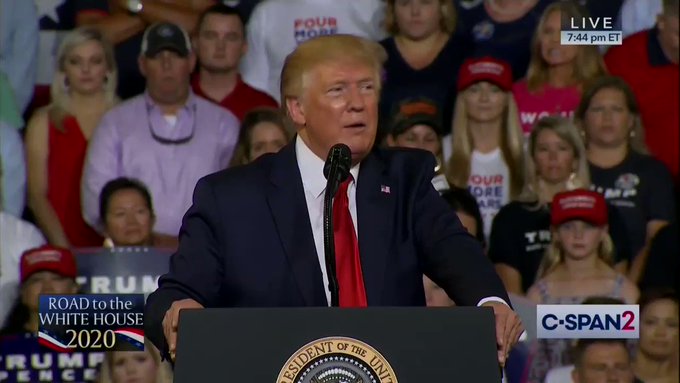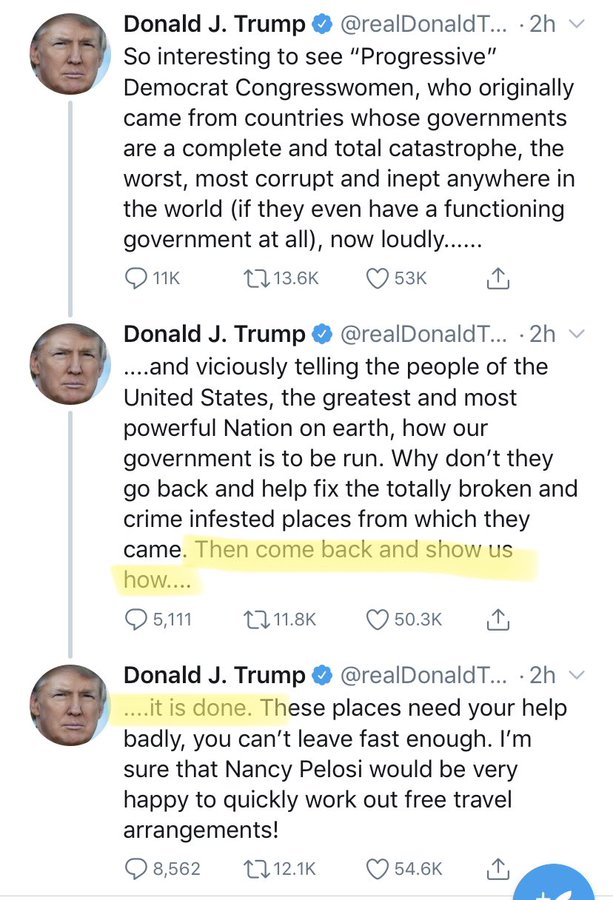Vox: The Trump racism spin cycle
Source: Vox – Confluence Daily is your daily news source for women in the know.
By
Trump is forcing conservatives to confront the real reason their base hates Rep. Ilhan Omar.
President Donald Trump and his most ardent supporters have, once again, made the subtext into blatant, blaring text.
We are deep in the Trump cycle of racist invective, in which the president says something offensive, waits for political allies to either quietly condemn the comments or embrace them with explanations of how they aren’t offensive, and then says something else egregious mere days later. It has continued apace.
The fallout began with Trump’s racist tweets demanding that four Democratic women in Congress — Reps. Alexandria Ocasio Cortez, Rashida Tlaib, Ayanna Pressley, and Ilhan Omar — “go back” to the “crime infested places from which they came.” (All four women, for the record, are American citizens, and only one, Omar, was born overseas, arriving in the US at age 10.)
Days later, Trump again decried the four women at a rally in North Carolina on Wednesday evening. He aimed much of his ire at Omar. In response to Trump’s attacks, the crowd chanted, “Send her back.” Soon after, he told the audience, “if they don’t love it, tell them to leave it.”
Before the rally, some conservatives had hoped that perhaps Trump could separate policy disagreements with the four members of “the Squad” or accusations of misconduct from their ethnicity, place of origin, or race. Other conservatives even argued that perhaps Trump meant that the four women should love America (in a way they deem fitting) or leave the country, and that his remarks didn’t come close to demanding their forced deportation.
But Wednesday’s rally made it crystal clear what Trump meant by his tweets and, perhaps more importantly, how Trump’s biggest supporters interpreted them.
Even as some conservative thought leaders continue to debate the best possible interpretation of his comments — or even the most desperately hoped for interpretation, however unlikely — what this incident showed, again, is that Trump thinks his supporters want to hear racist invective, and he is more than prepared to give it to them.
When attempted explanations meet Trump
To be clear, there were many on the right who criticized or condemned Trump’s tweets, though markedly few in Congress. They condemned Trump’s Sunday tweets as xenophobic and thoughtless at absolute best, and, in any case, deeply damaging to his reelection hopes (which will depend on voters who lie outside of Trump’s very small base).
But others, both in Congress and in right-leaning media, seemed to alternatively embracethe tweets wholeheartedly, downplay their importance, or excuse the remarks. Some argued, as deputy director of communications for Trump’s 2020 campaign Matt Wolking did, that perhaps he didn’t mean what he clearly seemed to mean.
The reinterpretations of Trump’s tweets were numerous: Breitbart’s John Hayward said on Tuesday that Trump “told them to go to the countries they clearly see themselves as representing,” and was simply calling out Democrats on their “vicious bullshit.” (I asked Hayward what country Ayanna Pressley, a black legislator born in Cincinnati, Ohio, would “go back” to, but received no response.)
That’s because among conservatives, the Squad is both very well known and very unpopular, the subject of constant coverage in right-leaning publications. Although those publications would likely argue they are simply responding to constant — and, in their view, nearly unanimously positive — media coverage in mainstream publications.
But Trump’s vitriol against the four Democratic lawmakers — and more specifically, Omar — has not been focused on their views or allegations of misconduct. (For an example of what that might have looked like, National Review’s Jim Geraghty produced a list of concerns with Omar, including allegations of anti-Semitism, campaign finance violations, and immigration fraud that have been percolating among conservatives for months.)
Rather, the president’s ire is laser-focused on the lawmakers’ purported un-Americanness for inadequately loving the country in which they were born or, in Omar’s case, immigrated to. In fact, before the rally in North Carolina began, Trump’s daughter-in-law Lara Trump led the crowd in a call-and-response chant, saying, “If you don’t love our country, the president said it, you can …” to which the crowd responded, “Leave.”
It’s worth noting here that Trump himself campaigned largely on America being, in his words, “a hellhole” only he could fix.
The voices overshadowed by Trump’s biggest supporters (and silent Republicans in Congress)
Trump may have found a new 2020 campaign slogan in the “send her back” chants, believing that painting the Squad as representative of the entire Democratic Party, while inaccurate, will prove effective in proving that Democrats are unhinged socialists bent on destroying America.
Although Trump said Thursday that he “disagreed” with the chanting, he said the sameabout the infamous “lock her up” chants of 2016 before bringing them up approvingly in a debate against Hillary Clinton. His supporters in conservative media have compared the “send her back” chant to chants at a sporting event, but others have noted that in actual sporting events, racist chants have led to severe sanctions.
For conservatives who want to focus on the policies of the four lawmakers and not on whether being critical of Trump should require their forced removal from the country, Wednesday’s rally poses a large and concerning political (and, really, moral) obstacle. In short, his rally comments make it harder for them to argue that Democrats like Omar or Ocasio-Cortez are more dangerous to American life than Republicans.
Conservatives like former Louisiana Gov. Bobby Jindal have tried to make the case that “Trump’s Foes Are Crazier Than He Is,” but a crowd chanting that an American citizen should be forcibly removed from the country for disagreeing with the president, and the president seemingly basking in the chants, makes that a tough sell. On The View, Meghan McCain saidthat Trump was “taking away my agency to criticize [Omar’s] policy” by “making this about race, xenophobia, racism.”
As the American Conservative’s Rod Dreher put it, “There are things worse than a president who is radically pro-abortion, opposed to religious liberty, and favoring open borders. It’s having a president who recklessly endangers the lives of people for the sake of winding up a mob.”
Seth Mandel, a conservative writer and executive editor of the Washington Examiner magazine, has spoken frequently on his concerns about anti-Semitism on the political left. He told me that Trump’s rally will make it tougher for conservatives to talk critically about the Squad without giving further credence to Trump’s racism and xenophobia.
“I think the rally absolutely complicates the process of having a serious conversation about Omar’s anti-Semitism. The way Democrats have sought to deflect criticism of Omar is by painting it all as racist and/or incitement. Having the leader of the Republican Party launch racist attacks on her makes the first part of that equation easy. Doing so at a rally where a crowd of supporters chants the racist attack is, as I described it at the time, menacing, which makes the second part of the equation easier,” he said.
He added, “It’s important to not let folks cynically use this to ignore Omar’s own bigotry, so this isn’t an excuse,” and then told me, “the increased tribalism of US politics right now is a massive roadblock to addressing the bigotry of public officials.”
But this entire news cycle has happened before, and will happen again, and will create the same result. Trump will say something racist, and many on the right will object, decrying a lack of civility on all sides. Trump’s biggest defenders will then try to explain how his comments weren’t racist but actually incredibly sensible.
Surely, Trump’s comments regarding Judge Gonzalo Curiel weren’t racist because Curiel was a member of a Latino lawyers association with a similar name to another group that opposed Trump. Surely, the travel ban or Trump’s remarks about “shithole countries” (and his wish for more immigration from Norway) weren’t racist because that’s just how “forgotten America” talks. Trump’s tweets urging four congresswomen to “go back” where they came from weren’t racist because what does “racist” even mean anymore? And even now, some conservativesare defending the rally chant because Omar’s past remarks are “blatantly anti-American” and thus the chant wasn’t a big deal.
Since 2015, many on the right, both conservative and not, have responded not to what Trump says but to what they think he meant by what he said, viewing Trump not as an individual, but a tabula rasa upon which their biggest hopes could be projected.
So Trump will continue to say racist things, and his biggest defenders will either interpret those racist things in the most positive way possible or embrace his racism wholeheartedly because, as the Bulwark’s Andrew Egger wrote, “For a critical mass of conservatives, it is a sign that a given act is actually praiseworthy and brave if it draws condemnation from the despised left-wing media.”
Mandel told me that the Trump rally puts House Speaker Nancy Pelosi in a tough position, caught between the most progressive wing of her party and Trump. But I’d argue that conservatives are caught in an even tougher one: challenge Trump and face the ire of his base, or submit to him, and his racism, with the hope that perhaps this will all just go away.
Confluence Daily is the one place where everything comes together. The one-stop for daily news for women.













